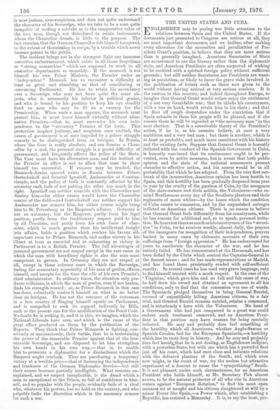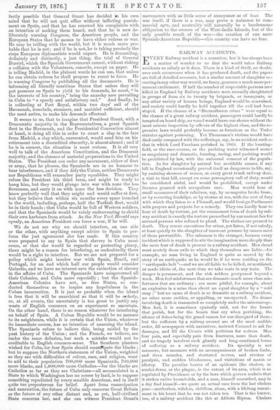THE UNITED STATES. AND CUBA.
ENGLISHMEN may be paying too little -attention to the relations between Spain and the United States. If the documents just presented to Congress are serious at all., they are most important documents, and we incline after making every allowance for the necessities and peculiarities of Pre- sident Grant's position, to believe that they are more serious than is generally imagined. American Secretaries of State are accustomed to use the literary rather than the diplomatic style, and American Presidents are often suspected of wishing to be credited with a spirited foreign policy without sufficient grounds ; but still neither Secretaries nor Presidents are want- ing in patriotism, or likely to incur the grave risks involved in the publication of letters such as those now given to the world without having arrived at very serious resolves. It is the custom in this country, and indeed throughout Europe, to imagine that General Grant would rather enjoy the excitement of a not very formidable war; that he thinks his countrymen, with a war on hand, would retain him in his chair ; and that he fires off rough despatches under the conviction that if Spain submits to them his people will be pleased, and if she resents them he will be regarded as "the necessary man "in the next election. That is a conceivable theory of the President's action, if he is, as his enemies believe, at once a very ambitious and a very bad man ; but there is another, which is at least as probable, and much more consistent with his history and the existing facts. Suppose that General Grant is honestly irritated with the conduct of the Spanish Government in Cuba, is honestly convinced that its continuance ought to be pre- vented, even by active measures, but is aware that both public opinion and the state of the national armaments present obstacles to effective action, and his course would be in all probability that which he has adopted. From the very first out- break of the insurrection, American opinion has been hostile to Spain, and this hostility has been gradually deepened from year to year by the cruelty of the garrison of Cuba, by the arrogance of the slave-owners and their militia, the Volunteers—who re- mind Northerners every day of the Southern planters and their regiments of mean whites—by the losses which the condition of Cuba causes to commerce, and by the unpunished outrages inflicted on American citizens. There is no reason to believe that General Grant feels differently from his countrymen, while he has reasons for additional and, so to speak, personal irrita- tion. He hears ten times as much as his countrymen of the " atroci- ties " in Cuba, for he receives weekly, almost daily, the prayers of the insurgents for recognition of their independence, prayers backed in many cases by elaborate accounts of their own sufferings from "foreign oppression." He has endeavoured for years to ameliorate the character of the war, and he has entirely failed. He has remonstrated at the Havannah, and has been defied by the Clubs which control the Captains-General in the fiercest terms • and he has made representations at Madrid, and has found hem persistently evaded with self-sufficient suavity. In several cases he has used very grave language, only to find himself treated with a mock respect. In the case of the Virginius,' which gave him and us full and fair cause of war, he half drew his sword and obtained an agreement to all his conditions, only to find- that the concession was one of words. The Spaniards pledged themselves to bring General Burriel, accused of unjustifiably killing American citizens, to a fair trial, and General Burriel remains untried, retains a command, and is notoriously a hero with the Volunteers. No head of a Government who had just conquered in a great war could. endure such treatment unmoved, and an American Presi- dent in that position- may have reasons for being specially irritated. He may and probably does feel something of the hostility which all Americans, whether Anglo-Saxons or Spanish Creoles, feel for the European Spaniards,—a hostility which has its roots deep in history. And he may and probably does feel keenly.that he is not dealing, as Englishmen imkine, with a powerless State, but with one which has a powerful fleet just off his coast, which had once close and intimate relations with the defeated planters of the South, and which even now might, in the event of war, try the useless but attractive experiment of a descent to rouse the "sympathizing" South. It is not pleasant, under such circumstances, for an American President who holds himself, as Mr. Secretary Fish almost avows, to be the natural protector of all who rise in American waters against "European dictation," to find his most open menaces set at nought and his citizens slaughtered at will by a minor Power like Spain' —a Power which, after establishing a Republic, has restored a Monarchy. It is, to say the least, per- fectly possible that General Grant has decided in his own mind that he will not quit office without inflicting punish- ment on Spain and that he has renewed his complaints with an intention of making them heard, and that he is now de- liberately warning Congress, the American people, and the European States that he means to have either redress or war. He may be trifling with the world, but it is much more pro- bable that he is not; and if he is not, he is taking precisely the steps European diplomatists would expect. He is demanding, definitely and distinctly, a just thing, the trial of General Darnel, which the Spanish Government cannot, without risking a collision with the Volunteers, concede, except on paper. He is telling Madrid, in the plainest words he can use, that unless he can obtain redress he shall propose to resort to force. He is warning Congress by publishing all the documents. He is informing all friendly maritime States that unless they will put pressure on Spain to yield to his demands, he must, "in the interests of his country," bring the anarchy now prevailing in Cuba to "a speedy and satisfactory end." And finally, he is collecting at Port Royal, within two days' sail of the Havannah, ironclads, steamers and materiel sufficient, should the need arrive, to make his demands effectual.
It seems to us, that to imagine that President Grant, with a Democratic majority in the Representatives, a great Spanish fleet in the Havannah, and the Presidential Convention almost at hand, is doing all this in order to court a slap in the face from Madrid, a slap which, unresented, would send him on his retirement into a discredited obscurity, is almost absurd ; and if he is in earnest, the situation is most serious. It is all very well to talk of the American Constitution, and the Democrat majority, and the absence of material preparations in the United States. The President can order any movement, either of fleet or army, that he pleases, the Spaniards are in no humour to bear interference, and if they defy the Union, neither Democrats nor Republicans will remember party squabbles. They might refuse the President his third term, and might be ready to hang him, but they would plunge into war with none the less fierceness, and carry it on with none the less decision. They know perfectly well that they might and would suffer at first, but they believe that within six months every spare ironclad in the world, including, perhaps, half the Turkish fleet, would be in their hands ; that Cuba would be full of Western soldiers, and that the Spaniards would be vainly endeavouring to shield
• their own harbours from attack. As the New York Herald says openly, an American President can force a war, if he will.
We do not see why we should interfere, on one side or the other, with anything except advice to Spain to per- form the just agreement she has made. If this country were prepared to say to Spain that slavery in Cuba must cease, or that she would be regarded as protecting piracy, there might be a reason for interfering, as undoubtedly there would be a right to interfere. But we are not prepared for a policy which might involve war with Spain, Brazil, and Portugal, for an end which half our people would consider Quixotic, and we have no interest save the extinction of slavery in the affairs of Cuba. The Spaniards have misgoverned all their Colonies, and Cuba more especially ; but the Spanish- American Colonies have not, as free States, so con- ducted themselves as to inspire any hopefulness in the Cuban insurrection. It is just as probable when the island is free that it will be anarchical as that it will be orderly, or, at all events, the uncertainty is too great to justify any waste of English resources on an experiment so uncertain. On the other hand, there is no reason whatever for interfering on behalf of Spain. A Cuban Republic would be no menace to its neighbours, while it is certain that the Union, whatever its immediate course, has no intention of annexing the island. The Spaniards refuse to believe this, being misled by the past history of the Union ; and the French, we believe, are under the same delusion, but such a mistake would not be creditable to English common-sense. The Southern planters wished for Cuba, for fear Spain should emantiipate the blacks ; but to suppose the Northern statesmen of the Union, weighted as they are with difficulties of colour, race, and religion, want to add to their population 700,000 more Spaniards, 700,000 more blacks, and 1,400,000 more Catholics—for the blacks are Catholics as far as they are Christians—all accumulated in a State to which Washington has no access by land, is to suppose something repudiated by every sensible American, and in itself quite too preposterous for belief. Apart from emancipation and annexation, the future of Cuba only concerns Great Britain as the future of any other distant and, as yet, half-civilised State concerns her, and she can witness President Grant's
movements with as little sense of annoyance as of fear. The war itself, if there is a war, may prove a nuisance to aom- mercial rgen, and neutrality will naturally be a burdensome obligation to the owners of the West-India Islands, but of the only possible result of the war—the creation of one more Spanish-American Republic—this country can have no fear.







































 Previous page
Previous page